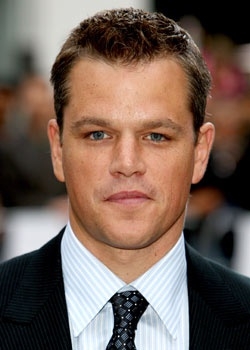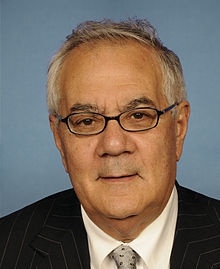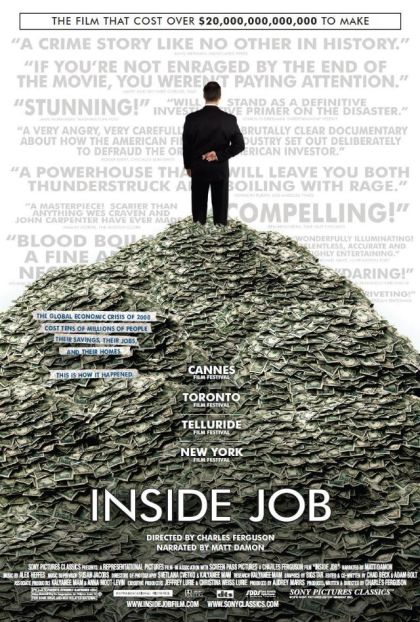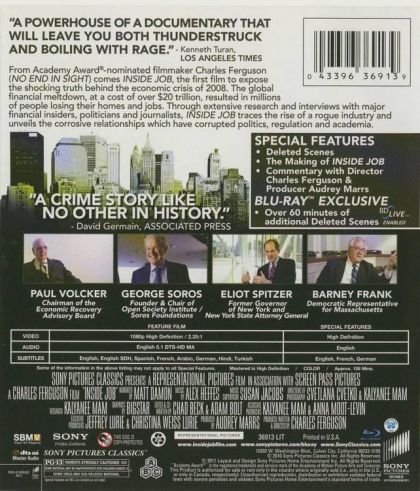A film that exposes the shocking truth behind the economic crisis of 2008. The global financial meltdown, at a cost of over $20 trillion, resulted in millions of people losing their homes and jobs. Through extensive research and interviews with major financial insiders, politicians and journalists, Inside Job traces the rise of a rogue industry and unveils the corrosive relationships which have corrupted politics, regulation and academia.
'Inside Job' provides a comprehensive analysis of the global financial crisis of 2008, which at a cost over $20 trillion, caused millions of people to lose their jobs and homes in the worst recession since the Great Depression, and nearly resulted in a global financial collapse. Through exhaustive research and extensive interviews with key financial insiders, politicians, journalists, and academics, the film traces the rise of a rogue industry which has corrupted politics, regulation, and academia. It was made on location in the United States, Iceland, England, France, Singapore, and China. Written by Anonymous
SYNOPSIS
The subject of Inside Job is the global financial crisis of 2008. It features research and extensive interviews with financiers, politicians, journalists, and academics. The film follows a narrative that is split into five parts.
The film focuses on changes in the financial industry in the decade leading up to the crisis, the political movement toward deregulation, and how the development of complex trading such as the derivatives market allowed for large increases in risk taking that circumvented older regulations that were intended to control systemic risk. In describing the crisis as it unfolded, the film also looks at conflicts of interest in the financial sector, many of which it suggests are not properly disclosed. The film suggests that these conflicts of interest affected credit rating agencies as well as academics who receive funding as consultants but do not disclose this information in their academic writing, and that these conflicts played a role in obscuring and exacerbating the crisis.
A major theme is the pressure from the financial industry on the political process to avoid regulation, and the ways that it is exerted. One conflict discussed is the prevalence of the revolving door, whereby financial regulators can be hired within the financial sector upon leaving government and make millions.
Within the derivatives market, the film contends that the high risks that began with subprime lending were transferred from investors to other investors who, due to questionable rating practices, falsely believed that the investments were safe. Thus, lenders were pushed to sign up mortgages without regard to risk, or even favoring higher interest rate loans, since, once these mortgages were packaged together, the risk was disguised. According to the film, the resulting products would often have AAA ratings, equal to U.S. government bonds. The products could then be used even by investors such as retirement funds who are required to limit themselves to the safest investments.
Another point is the high pay in the financial industry, and how it has grown in recent decades out of proportion to the rest of the economy. Even at the banks that failed, the film shows how bank executives were making hundreds of millions of dollars in the period immediately up to the crisis, all of which was kept, again suggesting that the risk/benefit balance has been broken.
One topic which few others have addressed is the role of academia in the crisis. Ferguson notes, for example, that Harvard University economist, and former head of the Council of Economic Advisers under President Ronald Reagan, Martin Feldstein, was a director of the insurance company AIG and former board member of the investment bank J.P. Morgan & Co..
Ferguson also notes that many of the leading professors and leading faculty members of the economics and business school establishments often derive large proportions of their incomes from either engaging as consultants, or speaking engagements. For example, current dean of the Columbia Business School, Glenn Hubbard, received a large percentage of his annual income from either acting as a consultant or through speaking engagements. Hubbard was also affiliated with KKR and BlackRock Financial. Hubbard as well as current chair of Harvard's department of economics, John Y. Campbell, deny the existence of any conflict of interest between academia and the banking sector.
The film ends by contending that despite recent financial regulations, the underlying system has not changed; rather the remaining banks are only bigger, while all the incentives remain the same, and not a single top executive has been prosecuted for their role in the global financial meltdown.





























 English
English  Nederlands
Nederlands  Deutsch
Deutsch  Français
Français  Español
Español  Magyar
Magyar  српски
српски  Dansk
Dansk  Italiano
Italiano  Svenska
Svenska  Slovenčina
Slovenčina  Português
Português 



